Related Research Articles
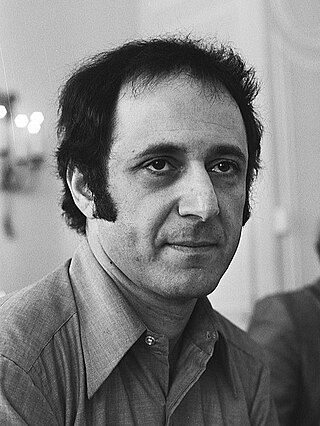
Stephen Michael Reich is an American composer who is known for his contribution to the development of minimal music in the mid to late 1960s. Reich's work is marked by its use of repetitive figures, slow harmonic rhythm, and canons. Reich describes this concept in his essay, "Music as a Gradual Process", by stating, "I am interested in perceptible processes. I want to be able to hear the process happening throughout the sounding music." For example, his early works experiment with phase shifting, in which one or more repeated phrases plays slower or faster than the others, causing it to go "out of phase." This creates new musical patterns in a perceptible flow.
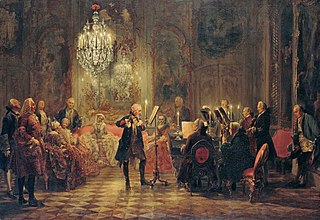
Chamber music is a form of classical music that is composed for a small group of instruments—traditionally a group that could fit in a palace chamber or a large room. Most broadly, it includes any art music that is performed by a small number of performers, with one performer to a part. However, by convention, it usually does not include solo instrument performances.
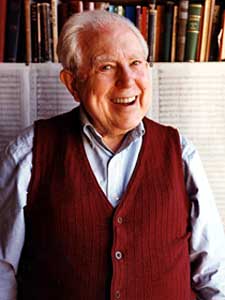
Elliott Cook Carter Jr. was an American modernist composer. One of the most respected composers of the second half of the 20th century, he combined elements of European modernism and American "ultra-modernism" into a distinctive style with a personal harmonic and rhythmic language, after an early neoclassical phase. His compositions are performed throughout the world, and include orchestral, chamber music, solo instrumental, and vocal works. The recipient of many awards, Carter was twice awarded the Pulitzer Prize for his string quartets; he also wrote the large-scale orchestral triptych Symphonia: sum fluxae pretium spei.
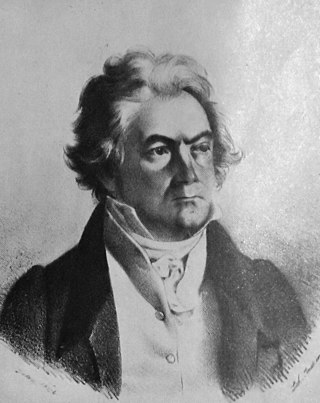
The String Quartet No. 15 in A minor, Op. 132, by Ludwig van Beethoven, was written in 1825, given its public premiere on November 6 of that year by the Schuppanzigh Quartet and was dedicated to Count Nikolai Galitzin, as were Opp. 127 and 130. The number traditionally assigned to it is based on the order of its publication; it is actually the thirteenth quartet in order of composition.
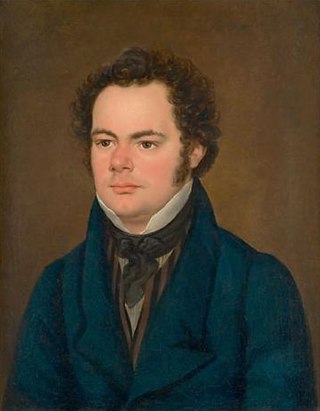
Franz Schubert's final chamber work, the String Quintet in C major is sometimes called the "Cello Quintet" because it is scored for a standard string quartet plus an extra cello instead of the extra viola which is more usual in conventional string quintets. It was composed in 1828 and completed just two months before the composer's death. The first public performance of the piece did not occur until 1850, and publication occurred three years later in 1853. Schubert's only full-fledged string quintet, it has been praised as "sublime" or "extraordinary" and as possessing "bottomless pathos," and is generally regarded as Schubert's finest chamber work as well as one of the greatest compositions in all chamber music.
Christopher Chapman Rouse III was an American composer. Though he wrote for various ensembles, Rouse is primarily known for his orchestral compositions, including a Requiem, a dozen concertos, and six symphonies. His work received numerous accolades, including the Kennedy Center Friedheim Award, the Grammy Award for Best Classical Contemporary Composition, and the Pulitzer Prize for Music. He also served as the composer-in-residence for the New York Philharmonic from 2012 to 2015.

Guto Pryderi Puw is a Welsh composer, university lecturer and conductor. He is considered to be one of the most prominent Welsh composers of his generation and a key figure in current Welsh music. Puw's music has been broadcast on BBC Radio 3 and been featured on television programmes for the BBC and S4C. He has twice been awarded the Composer's Medal at the National Eisteddfod.
The Calder Quartet (CQ) is a string quartet based in Los Angeles, California. Founded in 1998 at the University of Southern California, the group takes its name from American sculptor Alexander Calder. The ensemble is currently composed of its founding members, including violinists Benjamin Jacobson and Tereza Stanislav, violist Jonathan Moerschel, and cellist Eric Byers. Los Angeles Times music critic, Mark Swed called the CQ "one of America's great string quartets." In 2014, the CQ was awarded one of Lincoln Center's prestigious Avery Fisher Career Grants for "professional assistance and recognition to talented instrumentalists who the Recommendation Board and Executive Committee believe have great potential."
Symphony No. 2 is a symphony in three connected movements for orchestra by the American composer Christopher Rouse. The piece was commissioned by the Houston Symphony and completed July 15, 1994. The work premiered later that year and is dedicated to then Houston Symphony director Christoph Eschenbach.
Symphony No. 4 is an orchestral composition in two movements by the American composer Christopher Rouse. The work was commissioned by the New York Philharmonic, for which Rouse was then composer-in-residence. The piece was completed June 30, 2013 and was premiered on June 5, 2014, in Avery Fisher Hall, New York City, by the New York Philharmonic under the direction of Alan Gilbert.
The Flute Concerto is a concerto for flute and orchestra by American composer Christopher Rouse. The work was jointly commissioned by Richard and Jody Nordlof for flautist Carol Wincenc and by Borders Group for the Detroit Symphony Orchestra. It was completed August 15, 1993 and premiered on October 27, 1994 at Orchestra Hall in Detroit, with conductor Hans Vonk leading Carol Wincenc and the Detroit Symphony Orchestra. The piece's third movement is dedicated to the memory of James Bulger, an English toddler who was murdered in 1993 by two ten-year-old boys.
Prospero's Rooms is a single-movement orchestral composition by the American composer Christopher Rouse. The work was commissioned by the New York Philharmonic, for which Rouse was composer-in-residence, and was completed in 2011. The title comes from the Edgar Allan Poe short story "The Masque of the Red Death," in which the main character Prince Prospero and his fellow aristocrats try to escape the ravages of a plague known as the "Red Death" by locking themselves away from the outside world during a masquerade ball.
The Concerto for Orchestra is an orchestral composition by the American composer Christopher Rouse. The work was commissioned by the Cabrillo Festival of Contemporary Music and is dedicated to conductor and frequent Rouse collaborator Marin Alsop. The piece was completed February 24, 2008 and premiered at the festival August 1, 2008, with Marin Alsop leading the Cabrillo Festival Orchestra.
The Violin Concerto is a concerto for violin and orchestra in two movements by the American composer Christopher Rouse. The work was commissioned for violinist Cho-Liang Lin by the Aspen Music Festival and School and funded in part by a grant from the National Endowment for the Arts. It was completed August 18, 1991 and is dedicated to Cho-Liang Lin.
Compline is a septet for flute, clarinet, harp, and string quartet by the American composer Christopher Rouse. The work was commissioned by the Chamber Music Society of Lincoln Center through an award from the Koussevitzky Music Foundation. It was first performed by the Chamber Music Society of Lincoln Center on December 6, 1996 at Alice Tully Hall in the Lincoln Center for the Performing Arts. The piece is dedicated to the memory of Natalie and Serge Koussevitzky.
The String Quartet No. 2 is the second string quartet by the American composer Christopher Rouse. The work was commissioned by the Cleveland Quartet with additional contributions from the Eastman School of Music and was completed May 6, 1988. It was given its world premiere at the Aspen Music Festival by the Cleveland Quartet in July 1988. Rouse dedicated the composition to the people of the Soviet Union.
My Beautiful Scream is a concerto for amplified string quartet and orchestra by the American composer Julia Wolfe. The work was jointly commissioned by Radio France, the Basel Sinfonietta, and the Brooklyn Philharmonic for the Kronos Quartet. It was first performed on February 6, 2004 at the Festival Presence in Paris by the Orchestre Philharmonique de Radio France and the Kronos Quartet.
The String Quartet No. 1 is the first string quartet by the American composer Christopher Rouse. The work was commissioned by the Casella Quartet and completed on June 7, 1982.
Absolute Jest is a concerto for string quartet and orchestra by the American composer John Adams. The work was commissioned by the San Francisco Symphony for the orchestra's centennial. Its world premiere was given at the Louise M. Davies Symphony Hall on March 15, 2012, and was performed by the St. Lawrence String Quartet and the San Francisco Symphony under the direction of Michael Tilson Thomas. However, after the premiere Adams heavily re-wrote the beginning of the piece; this revised version of Absolute Jest was first performed in Miami Beach on December 1, 2012, by the St. Lawrence String Quartet and the New World Symphony under the composer's direction.
Berceuse Infinie is an orchestral composition by the American composer Christopher Rouse. The work was commissioned by the Baltimore Symphony Orchestra and was completed on July 1, 2016. It was first performed by the Baltimore Symphony Orchestra under the direction of Marin Alsop at Joseph Meyerhoff Symphony Hall on November 30, 2017. The piece is dedicated to Marin Alsop.
References
- 1 2 3 Rouse, Christopher (2010). String Quartet No. 3: Program Note by the Composer. Retrieved July 28, 2015.
- ↑ Rizzo, Frank (January 14, 2010). "International Fest Rolls Out Lineup". Hartford Courant . Retrieved July 28, 2015.
- ↑ Rizzo, Frank (June 10, 2010). "After 15 Years, New Haven Arts, Idea Festival Still Stimulating". Hartford Courant . Retrieved July 28, 2015.
- ↑ Smith, Steve (April 17, 2011). "Avoiding 'Moderato' Becomes a Style". The New York Times . Retrieved July 28, 2015.
- ↑ Hertzog, Christian (December 23, 2011). "The Classical Music Concerts We're Most Looking Forward to in 2012". LA Weekly . Retrieved July 28, 2015.